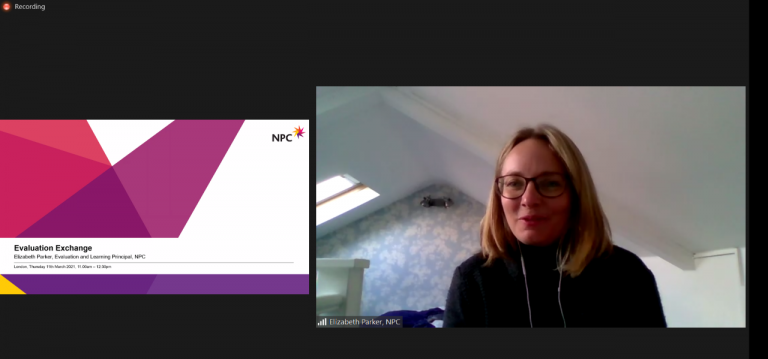Making time for evaluation and learning: top tips when resources are tight
18 March 2021
Dr Gemma Moore, UCL IEDE, and Elizabeth Parker, NPC, reflect on the Evaluation Exchange’s first taster session that brought together members of the voluntary and community sector to share their experiences of evaluating over the last year.

The Evaluation Exchange grew out of conversations, thinking about how the university could respond to the growing need to build capacity for evaluation practice in the local voluntary sector, and the need and desire for researchers to engage with communities and organisations. Following a successful pilot in 2018, we have re-launched the Evaluation Exchange, opening with a series of taster sessions. However, A LOT has happened since our pilot! The organisations and systems we are in, and who we are working with, are under immense pressure during a period of great uncertainty. So, how does evaluation and learning fit into the current context (if at all)?
We kicked off our taster sessions to find out more, focusing our discussion on “Making time for evaluation and learning when resources are tight”. Nearly 50 people from voluntary and community organisations joined the zoom session on 11th March, taking part in a reflective and thoughtful discussion on the implications for evaluation and learning during the pandemic.
The session started with a presentation from Elizabeth, who successfully summarised a 5-day training course on evaluation into 10 mins(!) with some key questions for us to think about (video available here). This gave the foundations for a wider discussion on evaluation and learning: sharing what people have been doing and what they felt was working (or not) in terms of evaluation practice.

What was evident was that there was no need to make the case for evaluation… the value of evaluation during this period of uncertainty was clear. For some, we heard how evaluation had become an essential activity: organisations had thought about what was useful for them, and collected real time data as part of their day to day delivery. Some spoke about this process and having to change processes, as Taskin Saleem, from Subco Trust, noted:
“We’ve changed our services 360 degrees over the last year. We had to discuss with our service users what we could do. Our service users are digitally excluded, so lots of work gone into using landline phones. We had to report back on the impact we were doing- some funders wanted reports every 3 month; some 6 months. The informal feedback for us was really important”.
Within small break out groups we asked people to share their top tips, and we’ve collated these into a top tips document compiled from the thoughts of groups present – so, generated by voluntary and community organisations for voluntary and community organisations.
As you will see, there was a wealth of knowledge and practical suggestions based on the experience of practitioners’ on the ground. Rather than list them all within this blog we have grouped them in to big three themes that emerged from the discussion:
- How we think about evaluation and learning. What was impressive was how much evaluation practice was active during the pandemic. But some noted how their evaluation practice had shifted: there was focused approach, considering the data they needed and why.
- How to evaluate. A lot of the discussion focused on the nitty gritty of “how” to design and conduct ongoing evaluations, thinking about what methods or tools worked (and with whom). Some organisations reflected upon how they had adjusted methodologies and methods to suit the context we are in (zoom polls, dot storming etc). It was great to see how many had leapt into action and adjusted practice (like creating virtual youth groups) and ensured that essential information was being collected. What we heard was the new situations brought new opportunities, but was also challenging.
What happens to the evaluation information collected. This last theme is crucial – how can the information collected inform learning? How can organisations incorporate evidence from evaluations into decision-making? Some people spoke about incorporating evaluative thinking and evaluation into their decision-making, using evaluation to bring about change. Some attendees shared how they discussed the data that had been collected at their weekly meetings- and it became instantly useful. They discussed individuals ‘case studies’ and they also looked for patterns within the data.
To us, these themes (and associated tips) emphasise the importance of thinking and working both systemically and systematically.
Finally, the taster session reminded us on the importance of having the space and time to listen and hear from others. Sharing between these organisations – and between UCL, NPC and voluntary and community sector - is incredibly valuable, we are keen to take forward further discussions on some of the topic raised. Keep learning! Support each other, collaborate and work together!
What next?
Now we have officially re-launched Evaluation Exchange! We have other sessions planned and will be looking for organisations who are interested in working with groups of researchers later this year. Please do ask if you want to know more or have any questions.
Photo by Omar Flores on Unsplash
 Close
Close

